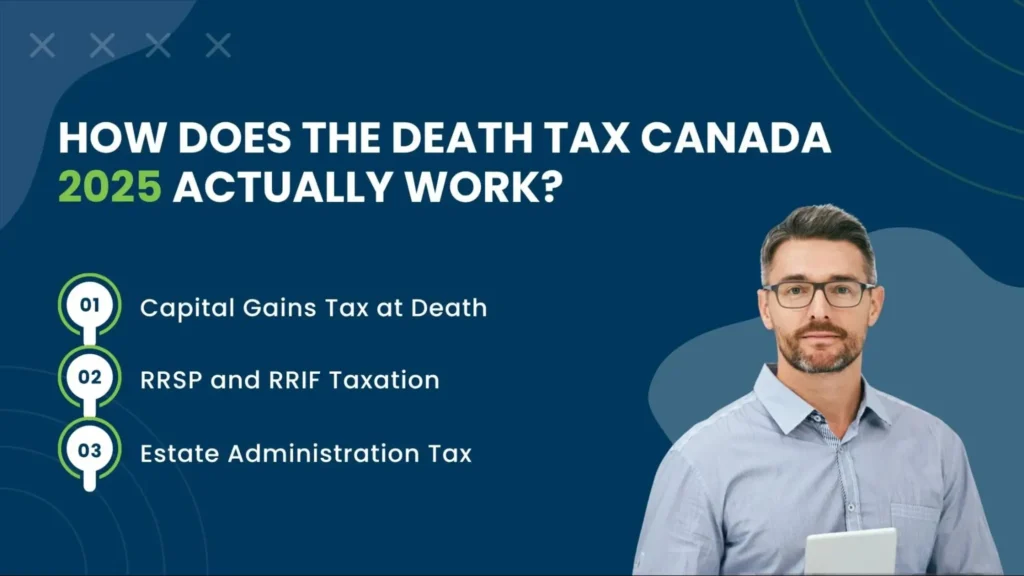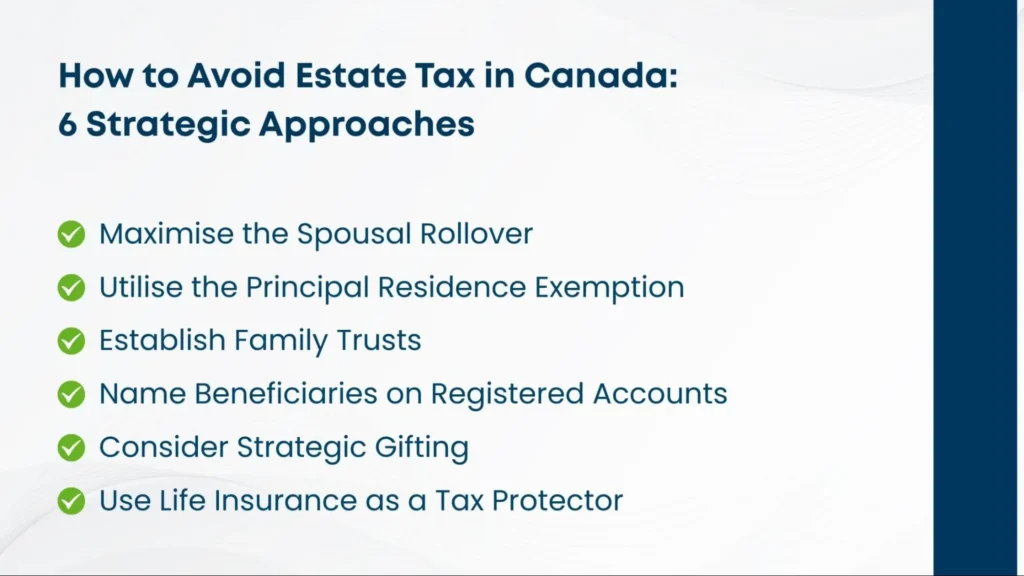Canada does not impose a direct estate tax or inheritance tax in 2025, yet the reality is far more complex than it appears. While beneficiaries do not pay taxes on inherited assets, the estate itself faces substantial tax obligations before any distribution occurs.
Understanding the estate tax in Canada 2025 is critical for protecting your legacy and ensuring more of your wealth reaches your loved ones rather than the Canada Revenue Agency.
Key Takeaways
- Canada has no formal estate tax, but a deemed disposition triggers capital gains tax at death
- RRSPs and RRIFs are fully taxable as income on the deceased’s final return
- Provincial probate fees can reach 1.5% of estate value in some provinces
- Strategic planning through spousal rollovers and trusts can significantly reduce the tax burden
- Over 54% of Canadians lack an estate plan despite the $1 trillion wealth transfer underway
Understanding the Estate Tax in Canada 2025
When Canadians hear “Does Canada have an estate tax?” the technical answer is no. However, the practical reality tells a different story. The estate tax in Canada 2025 manifests through three primary mechanisms: deemed disposition of assets, income inclusion from registered accounts, and provincial estate administration tax.
According to H&R Block Canada’s 2025 study, nearly one in three Canadians (31%) find it too morbid to focus on inheritance tax considerations, yet only 33% understand the tax implications of receiving inherited assets.
This knowledge gap is alarming, especially as Canada undergoes what experts call “The Great Wealth Transfer” – the largest intergenerational transition of wealth in Canadian history.

How Does the Death Tax Canada 2025 Actually Work?
The death tax Canada 2025 system operates through several interconnected tax obligations that executors must navigate before distributing assets to beneficiaries.
Capital Gains Tax at Death
Non-registered capital assets, including investment properties, stocks, mutual funds, and recreational properties, are subject to capital gains tax. Currently, 50% of any capital gain is taxable and added to the deceased’s income.
For 2025, this inclusion rate remains at 50% for all capital gains, as the proposed increase to 66.67% for gains exceeding $250,000 has been deferred until January 1, 2026.
For example, if a cottage purchased for $300,000 is valued at $500,000 at death, the $200,000 capital gain results in $100,000 of taxable income. Depending on the deceased’s total income and province of residence, this could trigger taxes ranging from 20% to over 54%.
RRSP and RRIF Taxation
Registered Retirement Savings Plans (RRSPs) and Registered Retirement Income Funds (RRIFs) face particularly harsh treatment. The entire fair market value of these accounts must be included as income in the year of death, not just the capital gains, but the full amount.
On a $500,000 RRIF, up to $250,000 could be payable in taxes depending on the province, as RBC Wealth Management notes.
This creates what experts call a “tax bomb” for estates, where the cumulative effect of registered account inclusion, combined with capital gains, can push the estate into the highest marginal tax bracket.
Estate Administration Tax
Provincial estate administration tax, commonly known as probate fees, adds another layer of cost. In Ontario, estates valued over $50,000 pay 1.5% ($15 per $1,000) on the amount exceeding $50,000.
For a $1 million estate, this equals $14,250 in probate fees alone. British Columbia charges 1.4% on amounts over $50,000, while Alberta maintains a flat fee structure, maxing out at $525 for estates over $250,000.
Inheritance Tax Canada 2025: Who Actually Pays?
The inheritance tax in Canada 2025 question often confuses Canadians. While there is no tax on money received as inheritance, the deceased’s estate must settle all tax liabilities before any distribution occurs.
Without a clearance certificate, executors face personal liability for any unpaid taxes. This certificate confirms that all tax obligations have been met and protects both the executor and beneficiaries from future CRA claims. The process typically requires filing all outstanding tax returns, paying assessed taxes, and submitting Form TX19 with supporting documentation.
According to a 2025 IG Wealth Management study, more than half (54%) of Canadians lack an estate plan, despite 76% saying it’s important to ensure their estate is taxed as little as possible.
How to Avoid Estate Tax in Canada: 6 Strategic Approaches
While you cannot eliminate all death-related taxes, strategic planning can substantially reduce the tax burden on your estate and preserve more wealth for your beneficiaries.
1. Maximise the Spousal Rollover
The spousal rollover provision allows tax-deferred transfers of RRSPs, RRIFs, and capital property to a surviving spouse or common-law partner. Assets transfer at their adjusted cost base, with taxes deferred until the surviving spouse disposes of the assets or passes away.
This strategy is particularly effective for corporate tax outsourcing and estate services, where married couples can defer significant tax liabilities.
2. Utilise the Principal Residence Exemption
Your primary residence is exempt from capital gains tax upon death, provided it qualifies as your principal residence for all years owned. This exemption can save hundreds of thousands of dollars in taxes, particularly in high-appreciation markets like Toronto and Vancouver.
Only one property per family unit per year can be designated as the principal residence, making strategic designation crucial for families owning multiple properties.
3. Establish Family Trusts
Family trusts offer powerful estate planning benefits by removing assets from the deemed disposition at death. Assets held in trust avoid both capital gains tax on death and probate fees.
Trusts also enable income splitting among family members in lower tax brackets, potentially reducing overall family tax liability. However, trusts face complex reporting requirements and ongoing compliance costs, making outsourced accounting essential.
4. Name Beneficiaries on Registered Accounts
Designating beneficiaries on RRSPs, RRIFs, TFSAs, and life insurance policies allows these assets to bypass probate entirely. Direct beneficiary designations transfer assets faster, avoid probate fees, and provide privacy as they don’t form part of the public estate record.
Ensure beneficiary designations are current and coordinated with your overall estate plan through comprehensive estate advisory services.
5. Consider Strategic Gifting
While Canada has no gift tax, gifting assets during your lifetime can reduce estate size and probate fees. However, gifting appreciated assets triggers immediate capital gains tax at fair market value. The principal residence can be gifted tax-free if it qualifies for the exemption.
Strategic gifting requires careful tax analysis to balance immediate tax costs against future estate tax savings.
6. Use Life Insurance as a Tax Protector
Life insurance provides tax-free funds to cover estate tax liabilities without forcing beneficiaries to liquidate assets. Many people often ask, “Does Canada have an estate tax?” – while Canada doesn’t have a traditional estate tax, there can still be significant deemed disposition taxes on death.
A properly structured policy can preserve family cottages, businesses, and investment portfolios that might otherwise need to be sold to pay taxes. Joint last-to-die policies offer cost-effective coverage for married couples, with premiums typically lower than equivalent individual coverage.

TFSA and Estate Planning
Tax-Free Savings Accounts (TFSAs) offer unique advantages in estate planning. The value at death passes to beneficiaries tax-free, and when a spouse is named as successor holder (rather than beneficiary), the account continues as a TFSA without affecting the survivor’s contribution room.
However, any growth after the date of death is taxable unless properly transferred, making proper TFSA designation planning crucial.
The Clearance Certificate Process
Obtaining a clearance certificate represents the final step before distributing estate assets. Executors must file all required tax returns, receive notices of assessment, pay outstanding taxes, and submit Form TX19 with supporting documentation.
The CRA typically processes clearance certificate applications within several weeks to months, though complex estates may face longer delays.
Without this certificate, executors risk personal liability for taxes later discovered to be owing. For estates exceeding $100,000 or involving complex assets, professional executor services provide invaluable protection and expertise.
Looking Ahead: Estate Tax Planning in 2025 and Beyond
As Canada’s population ages, with Statistics Canada projecting one in five Canadians will be 65 or older by 2031, estate planning becomes increasingly critical. The ongoing $1 trillion intergenerational wealth transfer demands proactive planning to minimise tax erosion and preserve family wealth.
Recent surveys reveal concerning trends: only 15% of Canadians have comprehensive estate plans, while 52% haven’t explored inheritance-related matters relevant to them. This passivity costs families billions in unnecessary taxes and probate fees annually.
Taking Action: Protect Your Legacy Today
Understanding the estate tax in Canada 2025 is only the first step. Implementing effective strategies requires coordination among accountants, lawyers, and financial advisors who specialise in estate planning.
The complexity of deemed disposition rules, spousal rollover provisions, and provincial probate systems demands expertise that goes beyond general tax knowledge. By working with experienced estate planning professionals, you can develop a customised strategy that protects your legacy, reduces tax burdens, and provides peace of mind for you and your loved ones.
Don’t let the lack of a formal “estate tax” label mislead you; the tax consequences at death are real, substantial, and require careful planning. Request a consultation to ensure more of your hard-earned wealth reaches the people and causes you care about most.






